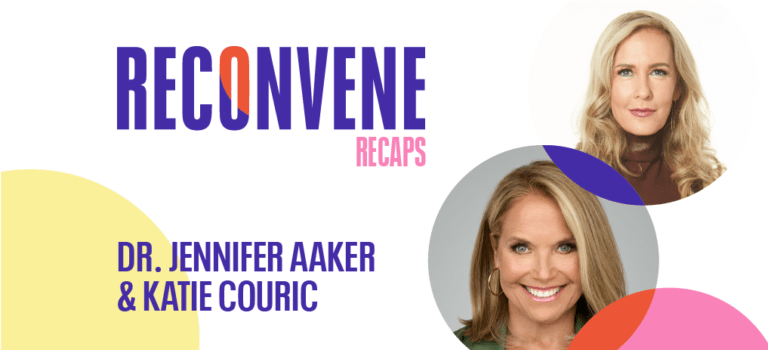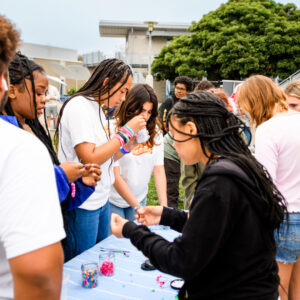Eventbrite hosted the RECONVENE summit in May 2021, bringing together thousands of event producers. We’re sharing key takeaways from popular sessions — on topics like safely returning to in-person events, data insights, and the importance of social connection — on our blog and our RECONVENE Recaps hub.
Social gatherings are resuming, and Dr. Jennifer Aaker and her friend Katie Couric are thrilled. Both have eagerly anticipated the opportunity to physically be together with others again, which they say is crucial for our happiness and well-being.
“Being lonely is the equivalent of smoking two packs of cigarettes a day, in terms of the adverse consequences on your overall well-being,” Couric said during a fireside chat. “This feeling of social isolation can really do bad things for your health.”
Aaker agreed: When you’re stuck at home during a pandemic, relying on social media and online tools to connect with others, you don’t experience the same health benefits you get from social connection in person. But now there’s light at the end of the tunnel, and Couric says she feels that energy on the streets of New York.
“It’s time to start feeling hopeful and also thoughtful about how we want to reset, renter, and come back into this new chapter of our lives,” says Aaker, who is a Stanford professor and social psychologist.
During Eventbrite’s RECONVENE summit, Couric joined Aaker in a conversation about the importance of bringing people together and how event organizers can leverage the power of humor in their work. Here are three takeaways for creators.
Watch Dr. Jennifer Aaker and Katie Couric’s full talk here:
Bringing people together in-person is still an important part of social connection
“We’re a social species, and our brains are literally wired to encourage social behavior,” Aaker says. It’s no surprise, then, that loneliness increased during the pandemic, while mental well-being decreased (especially among teenagers).
When you’re physically with other people at a gathering, the neurochemicals in your brain light up: You’re more likely to experience endorphins, which creates a feeling like a runner’s high, and to experience an oxytocin release, Aaker says. (Oxytocin is often referred to as the love hormone, and it makes you feel happy.)
Gathering together in person again will help offset the burnout many experienced during the pandemic, Aaker predicts. In-person events and gatherings will play a crucial role in recovering our mental well-being.
Always striving to laugh with your guests enhances social connection
Research has found that if you ask someone if they smiled or laughed the previous day, the answer suddenly becomes no around age 23. It “plummets,” Aaker says, and doesn’t become “yes” again until retirement age.
Not laughing is a travesty, she says: “Laughter is a social glue that really does bond people.”
She adds that humor isn’t the same thing as being funny; it’s simply having a mindset of levity. One of the best ways to accomplish this is to be able to understand each other’s humor styles. The four main styles are:
- The sniper: This person is edgy and dry, and the master of the unexpected dig.
- The standup: Bold and irreverent, this person is unafraid to ruffle feathers to get a laugh.
- The sweetheart: They’re earnest and understated, and lighten the mood.
- The magnet: This style refers to people who are expressive, charismatic, and infectious. (Couric identifies with this type.)
[cta id=”228563″]
Planning gatherings, even if you cancel them, is the first step to fostering social connection
After more than a year of quarantining, our social skills are a bit rusty, Couric says. So she asked Aaker: How can we create an environment where people are “going to really appreciate and take full advantage of these in-person gatherings?”
There are three ways, Aaker says:
- Plan the gatherings. The mere act of planning a gathering activates important pleasure centers in our brain, Aaker says. So start there, and if you need to cancel, it’s OK.
- Think about ways to complement the gathering, like dropping gifts off for your guests on the day of, or starting it with a ritual that makes everyone feel like they’re on the same page.
- Brand it: This could mean branding your opening ritual or the experience, so that there’s a name people can refer to it by. This will help them feel like part of a group and will also help people remember your gathering more fondly, Aaker says.
Interested in hearing more from Katie Couric? Start your mornings with Wake-Up Call, her daily newsletter that gives you the news you need to know each day. Subscribe now!






